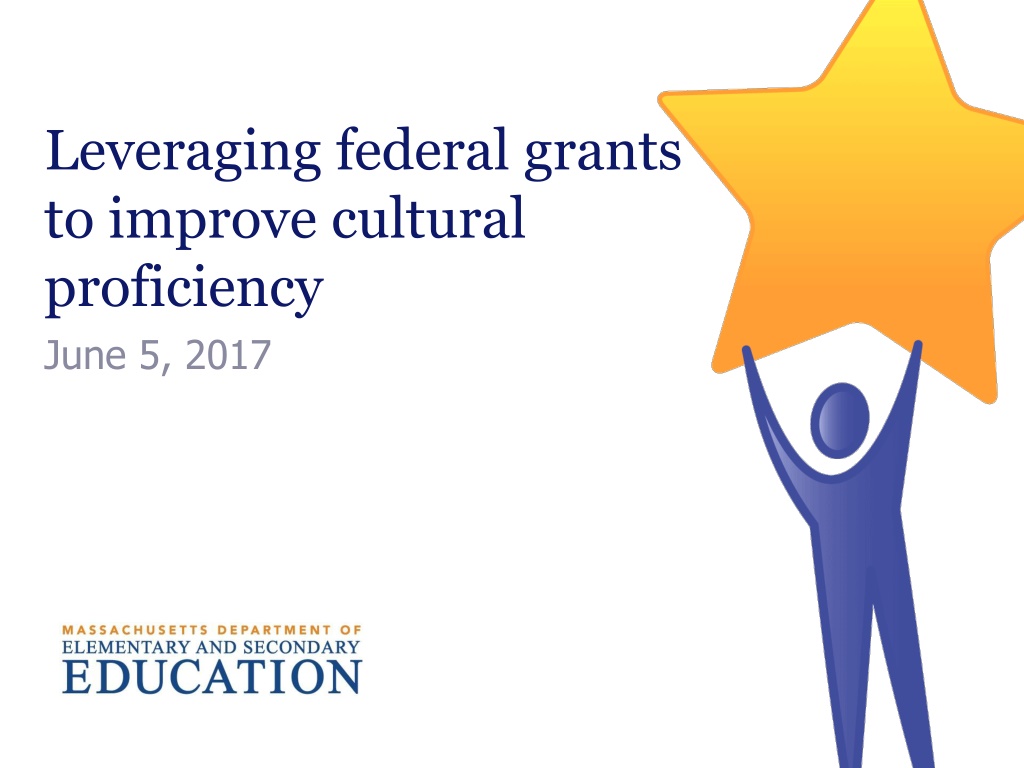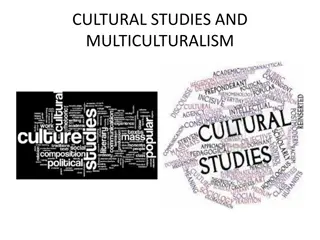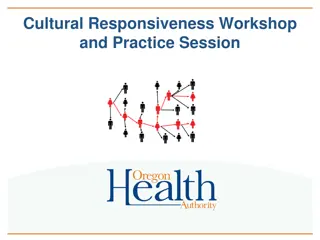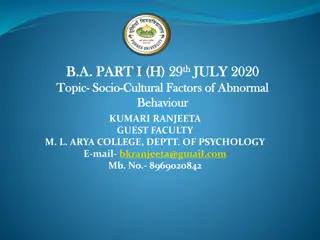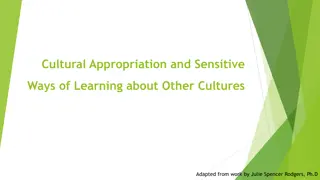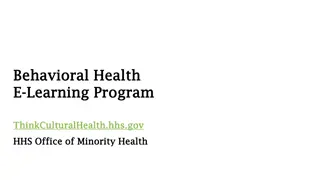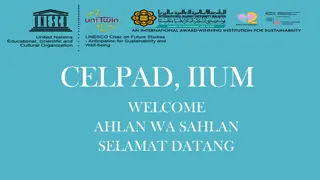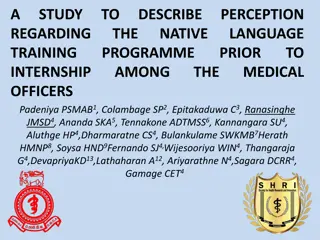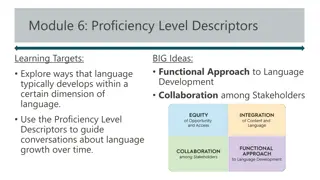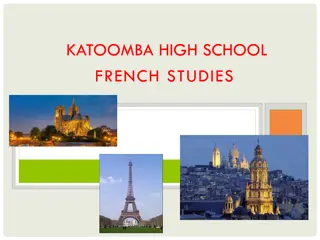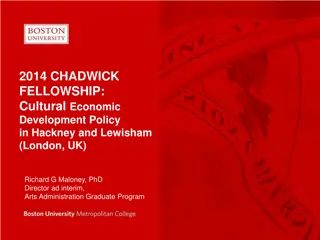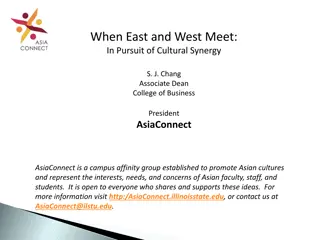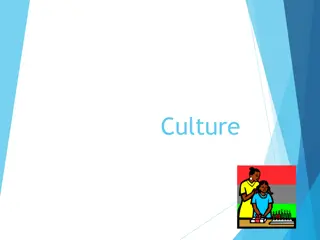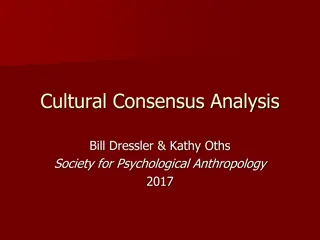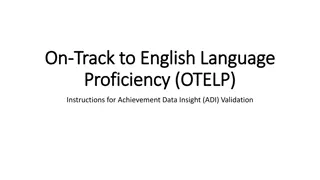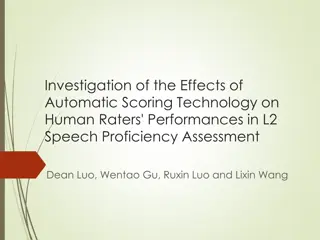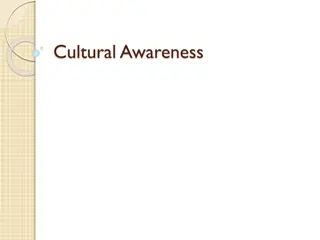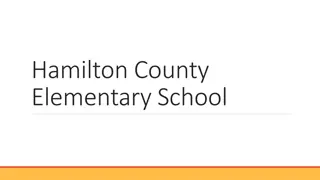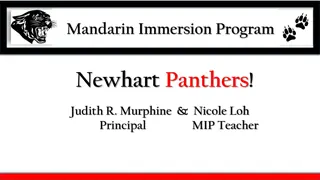Leveraging Federal Grants for Cultural Proficiency Improvement
Explore ways to enhance cultural proficiency in educational settings using federal grants such as Title I and Title IIA funds. Learn the definition of cultural proficiency, its importance in serving diverse student populations, and practical applications in teaching. Discover how to utilize these funds for professional development, training, and assessment to create a more inclusive learning environment.
Download Presentation

Please find below an Image/Link to download the presentation.
The content on the website is provided AS IS for your information and personal use only. It may not be sold, licensed, or shared on other websites without obtaining consent from the author. Download presentation by click this link. If you encounter any issues during the download, it is possible that the publisher has removed the file from their server.
E N D
Presentation Transcript
Leveraging federal grants to improve cultural proficiency June 5, 2017
Agenda Introduction & definition Uses of TI & TIIA funds UP Academy Holland Boston Public Schools Lexington Public Schools Reflection questions 2 Massachusetts Department of Elementary and Secondary Education
What do we mean by cultural proficiency ? Ability to serve students from diverse backgrounds Recognizing the differences among students and families from different cultural groups Responding to those differences positively Being able to interact effectively in a range of cultural environments * Sometimes called cultural responsiveness or cultural competency 3 *Lindsey, R.B. Robins, K.N. and Terrell, R.D. (2003). Cultural proficiency: A manual for school leaders. Thousand Oaks, CA: Corwin Press. Massachusetts Department of Elementary and Secondary Education
What do we mean by cultural proficiency ? More than knowledge of students backgrounds; application of knowledge in teaching 4 Ed Eval standards 2 & 3 Massachusetts Department of Elementary and Secondary Education
Using Title IIA funds (Not an exhaustive list) Courses, conferences & workshops Includes compensating educators for presenting to colleagues Training for mentors & mentees Professional Learning Communities & book study groups Training for paraprofessionals Can be part of a grow your own program Assessment of progress in cultural proficiency 5 Massachusetts Department of Elementary and Secondary Education
Using Title I funds (Not an exhaustive list) Professional development costs Stipends, substitutes, travel, etc Contracting with PD provider or consultant Related materials Salaries to fund staff doing this work (most likely a partial FTE or stipend) Title I funds for this work would most likely be in SW programs, or using PD reservation funds in TA 6 Massachusetts Department of Elementary and Secondary Education
Towards a Culturally Responsive Pedagogy Training Teachers @ UAH June 5th, 2017 1:00 pm
Our Time Today Our Vision & Goals Structures & Pathway In the Classroom & Keeping it Alive Questions 8
Remember that consciousness is power. Consciousness is education and knowledge. Consciousness is becoming aware. It is the perfect vehicle for students. Consciousness-raising is pertinent for power, and to be sure that power will not be abusively used, but used for building trust and goodwill domestically and internationally. Tomorrow's world is yours to build. 9
Our Vision & Goals Vision for the School Goals for Students & Staff Scope & Sequence for PD 10
We must be a culturally and community responsive school and build our critical consciousness. 11
Our big question this year was... How do we empower students to be agents of change in the world? 12
Goal for Students UAH scholars use what they know about themselves and others identities identities to dismantle oppressive systems in their community and, eventually, their world. 13
Goal for Staff Using the critical hope framework by Jeff Duncan- Andrade, UAH staff members will create conditions in our school and classrooms for deliberately confronting issues of race, class, and culture, power, privilege, and identity when interacting with students, families, and the community. 14
How are these goals connected to each other? How are they connected to the UAH vision? Exceptional teaching unlocks limitless opportunities for children. 15
Structures & Pathway PD Sessions CRP Discussion Groups Weekly Focus Monthly Celebrations 16
Conversation Agreements Speak from the I Create brave space Practice mindfulness Be aware of intent vs. impact Use intentional language Ask questions to clarify Compartmentalize personal feelings 17
In the Classroom & Keeping it Alive The CRP Lens Living in the Curriculum From Theory to Action Areas to Push 19
Questions? 20
Closing Appreciations Regrets Learnings Re-learnings 21
learnings re-learnings appreciations regrets C m n nhi u l m 22
Lexington A School-Community Partnership Approach to Cultural Competence & Bicultural Management Cynthia Tang School Counselor Lexington Public Schools ctang@lexingtonma.org
Agenda Current Landscape When People Care, it s a Priority $$$ Get Started. Build Momentum. 24 Massachusetts Department of Elementary and Secondary Education
Current Landscape Population 37% Asian Growing populations Transfer International ELL 25 Massachusetts Department of Elementary and Secondary Education
Current Landscape District Cultural Competence Seminar Series initiated & supported by Central Office developed by K-12 faculty team Cultural Competence offerings included in district programming: Lexington Learns (PD day) Better Beginnings (new teacher training) Mentor Institute (mentor/mentee training) 26 Massachusetts Department of Elementary and Secondary Education
District Examples Don t Believe Everything You Think: A Cultural Competence Seminar Series Promoting the Success and Well-Being of Asian & Asian-American Students Biculturalism in Asian and Asian-American Students 27 Massachusetts Department of Elementary and Secondary Education
Current Landscape School-Specific Newcomers Coffee ELL Newcomers Coffee School-wide anti-bias training & curriculum LHS Student Groups Asian Student Faculty Alliance What It s Like to Be Black at LHS Building Cultural Bridges ELL Nexxus Club 28 Massachusetts Department of Elementary and Secondary Education
School/Student Group Examples I got a B+ and that s not my blood type Harvard University Asian-American Mental Health Series Lexington Teen-Parent Community Dialogue 29 Massachusetts Department of Elementary and Secondary Education
Current Landscape Parent/Community Involvement Asian Parent Organizations: CAAL, IAL, KoLex Lexington Asian Community Alliance (LACA) Workshops offered by individual associations, jointly through LACA, and in partnership with LYFS/school. Connection/communication with superintendent. Lexington Youth and Family Services (LYFS) Asian Mental Health Initiative Teen-Parent Community Dialogues 30 Massachusetts Department of Elementary and Secondary Education
Parent/Community Examples Bicultural Management: A Community Challenge & Opportunity Education & Expectations: Building Understanding Across Cultures Academic Burnout vs. Academic Success College & Career: Debunking Myths Success for the Long Run 31 Massachusetts Department of Elementary and Secondary Education
When People Care, its a Priority Make It Relevant Responsive Real 32 Massachusetts Department of Elementary and Secondary Education
Make it: Relevant What is/are your district s population(s)? What arecommon experiences, observations, and/or challenges your faculty & administration talk about/seek support with? Why are _____ students like this? Why do ____ parents do this? What opportunities can you provide to help them serve students & their families better? 33 Massachusetts Department of Elementary and Secondary Education
Make it: Responsive One size fits many, but many sizes fit all. Your faculty are many, not one. Consider the role/program Your schools are many, not one. Consider the populations Start where we are. Needs change over time. So should your PD. Responsive means recurrent and embedded. 34 Remember: we want to do our job better because it means we will be able to help our students & families better. Help us do that. Massachusetts Department of Elementary and Secondary Education
Make it: Real Start with the self in mind Understanding others starts from understanding oneself. Identity development is for everyone. Let us talk Talk about what we are not supposed to talk about. Experience, experience, experience Inspiring compassion comes from being able to connect with another human s journey. Information is safe, but it is not enough. 35 Massachusetts Department of Elementary and Secondary Education
$$$ PTA Grants District/Department Grants District PD Funds 36 Massachusetts Department of Elementary and Secondary Education
Get Started. Build Momentum. Take inventory What is already happening in your district? Identify your cultural leader(s) and allies Who is/are leading or supporting this/these initiatives? Start with them. Look beyond the obvious . Partnerships, not silos It takes a village: in and out of the school. Spread the work Start before you re ready 37 Massachusetts Department of Elementary and Secondary Education
38 Massachusetts Department of Elementary and Secondary Education
Questions? 39 Massachusetts Department of Elementary and Secondary Education
Reflection What are common experiences, observations, and/or challenges your faculty & administration talk about/seek support with? Why are _____ students like this? Why do ____ parents do this? What are activities your district is already doing that could be expanded or adapted in order to improve educators cultural proficiency? What are some examples of internal or external people/resources that could be helpful in improving cultural proficiency? (The students are a resource, too.) 40 Massachusetts Department of Elementary and Secondary Education
Meagan Steiner TitleIIAGrants@doe.mass.edu Julia Foodman TitleI@doe.mass.edu 41 Massachusetts Department of Elementary and Secondary Education
